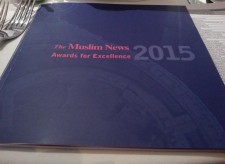(Photo: DoD /Master Sgt. Christopher DeWitt, U.S. Air Force/CC)
2019 is a welcome new beginning for many. The New Year is seen as a clean slate to start anew on an opportunity to commit to making better choices and cultivating better relationships. We will reflect on 2018’s legacy for climate, and look to 2019 with optimism, including suggestions for lowering our individual carbon footprints.
Science has blessed humanity with a certain level of foresight – about natural disasters, health problems, etc – so that we may be better prepared when the inevitable occurs. 2018 was a year of extremes and dire discoveries.
We learned from a UN report that climate change, if gone unchecked, could turn the world, as we know it, upside down in just over a decade. We learned that Africa’s baobab trees and Lebanon’s cedars are no match for a warming climate. And we learned that even in a progressive country like France where people know that climate change is dire and that measures must be taken to curb emissions, people would not bear the burden of tax increases to do so.
Unfortunately, 2018 saw the first spike in carbon emissions since 2010. The US leadership on tackling climate change has waned significantly since Donald Trump took office, vowing to bring back coal, opening up almost America’s entire coastline for oil drilling, and rolling back regulations that keep companies from polluting the surrounding air and water with their runoff. Still, the discovery of Oman’s carbon capturing rocks was a hopeful sign.
There has been a modest push to export the technology and execute it on a large scale to mineralize much of the carbon already in the atmosphere. Climate change reporting also increased – with more mainstream news organisations reporting on the effects, as they related to detrimental natural disasters.
Even though it will be hard to forget the intensity of 2018’s disasters, from Kerala’s floods, to California’s raging wildfires, the drought in Cape Town and super-typhoons in Asia, there is room for optimism in the coming year. The idea that acting now will stave off climate change altogether is a whimsical fiction, but steps are being taken to temper the effects.
The Sierra Club reported that fossil fuel divestment is still on the rise, youth movements are more empowered than ever as young people will bear the brunt of climate change’s effects, and that innovative “negative emissions technologies” are being developed.
Developing countries such as China and India are investing heavily in renewable energy sources, even though their Paris Climate commitments state that they can still reach peak carbon emissions in the future.
People are seeing how quickly their lives can change due to a warming planet, but instead of throwing their hands in the air, many are positioning themselves for a fight – demanding more from their governments and changing habits at home.
A few easy steps people can take to reduce their environmental impact include:
“Weekday veg” – This means trying to cut meat out of your diet between Monday and Friday, and only being carnivorous on weekends. It will cut 70% of your meat consumption without having to go 100% vegetarian. Avoiding meat and dairy is the single biggest thing you can do to reduce your carbon emissions.
Buy in bulk – Instead of buying cans of beans and packages of nuts, find a grocery store that offers these items in bulk. Take your own bag and weigh the food at the counter. It will save you money and keep packaging out of the waste stream.
Compost – Food waste emits a lot of methane, a greenhouse gas that is more than 20x more potent than CO2. By allowing your food waste to rot and using it to fertilize your garden, you can save on garbage bag costs and fertilizer.
Take a vacation closer to home – According to the New York Times, “Air travel accounts for about 3 percent of greenhouse gas emissions worldwide, but is one of the fastest-growing emissions sources.” By opting for train or bus travel, you can reduce your emissions contribution, while still seeing the beauty your region has to offer.
If 2018 taught us anything, it is that we have no more time for excuses. We cannot tolerate idle governments or economic incentives to pollute, but action starts with ourselves. The Qur’an includes numerous statements about environmental stewardship. If we are to respect He who bestowed such a gift – planet earth – we must take care of the gift itself.
Sarah Sakeena Marshall, English Language Teacher & Environmental Columnist

















